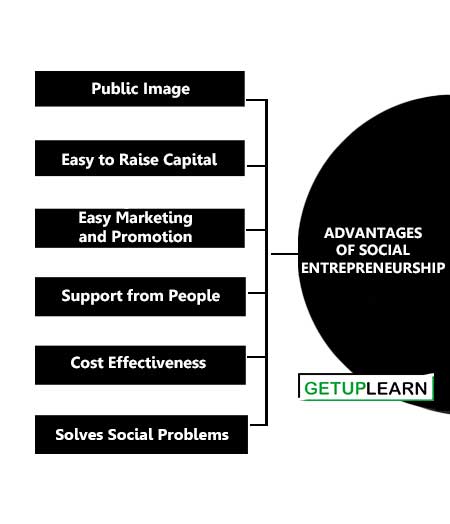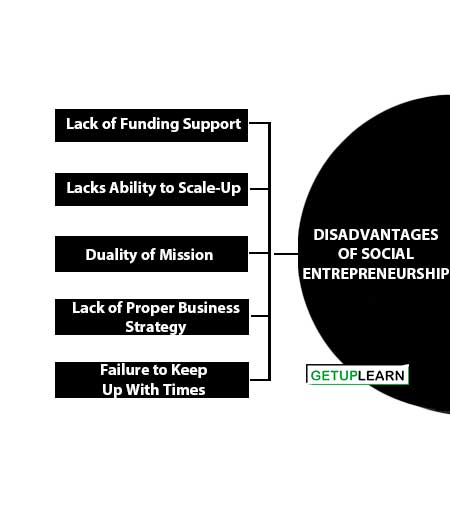Table of Contents
- 1 What is Social Entrepreneurship?
- 2 Characteristics of Social Entrepreneurship
-
3 Importance of Social Entrepreneurship
- 3.1 Bring Social Changes
- 3.2 Make World a Better Place
- 3.3 They Create Economic Value
- 3.4 Act as Catalysts for Social Change
- 3.5 Generate Social Value
- 3.6 Influence Government Policy
- 3.7 Create Unique Opportunities
- 3.8 Save Lives
- 3.9 Helps in Creating More Job Opportunities
- 3.10 Innovative Ideas to Make World a Better Place
- 3.11 To Connect With Customers Beyond Economic Purposes
- 4 Advantages of Social Entrepreneurship
- 5 Disadvantages of Social Entrepreneurship
- 6 FAQs Section
Social entrepreneurs combine commerce and social issues in a way that improves the lives of people connected to the cause. They don’t measure their success in terms of profit alone. The success of social entrepreneurs is that they have solved the social problem.
People are often attracted to businesses that use a social entrepreneurship model because they’re helping to solve a social problem when they spend money on something they need or want.
Social entrepreneurs often start their venture or initiative after recognizing the prevalence of a certain problem in society and creating a solution to address it using their entrepreneurial skills. Their overall goal is to make a positive societal change while creating social capital to further their objectives.
They are often very ambitious and persistent in tackling major social issues and offering their ideas for societal changes. Rather than leaving solutions to the government or business sectors, social entrepreneurs will likely analyze the situation and find solutions by changing the system and often persuading governments, large corporations, and sometimes even entire societies to join them to support their initiatives.
Social entrepreneurs will often devote much of their lives to their passions and interests in order to bring about positive changes in the areas they are concerned about.
These are the features or characteristics of social entrepreneurship:
- Passionate for Social Change
- Innovative Solutions
- Self-Supportive and Financially Sustainable
- Scaling Improvement
- Entrepreneurial Approach
- Objective
- Drivers of Change
- All Pervasive

They are passionate about their ideas and projects to achieve social change. Also, they address social issues to improve the lives of disadvantaged people within communities. Eg. an Ad campaign by various marketers showing girl children in a positive role has changed the attitude of people towards girl children.
Innovative Solutions
They identify and solve social, financial, and environmental problems using effective solutions. Besides, they practice innovative approaches to address public issues and bring positive change in society. Eg. Designing LED lights saves electricity as well as protects the environment.
Self-Supportive and Financially Sustainable
They do not depend on government subsidies to survive and generate capital to further the social cause. However, their primary focus remains to maximize social satisfaction.
Scaling Improvement
They primarily focus on expanding the scope of their actions to increase their social influence. As a result, they persuade societies, large corporations, and governments to support social entrepreneur ideas of social transformation.
Entrepreneurial Approach
They identify market possibilities, gather resources, develop creative solutions, and have a long-term impact on society. Also, they use feedback to improve their performance and stay persistent in their efforts to meet.
Objective
Its objectives should focus on investing the surplus in developing resources for the community and not just making economic profit.
Drivers of Change
Social entrepreneurs don’t do well in bureaucracies. They cannot sit back and wait for change to happen. They are the drivers of change.
All Pervasive
Social entrepreneurs are innovative, resourceful, and results-oriented. They draw upon the best thinking in both the business and non-profit worlds to develop strategies that maximize their social impact. These entrepreneurial leaders operate in all kinds of organizations: large and small; new and old; religious and secular; nonprofit, for-profit, and hybrid.
Let’s look at the importance of social entrepreneurship which is discussed below:
- Bring Social Changes
- Make World a Better Place
- They Create Economic Value
- Act as Catalysts for Social Change
- Generate Social Value
- Influence Government Policy
- Create Unique Opportunities
- Save Lives
- Helps in Creating More Job Opportunities
- Innovative Ideas to Make World a Better Place
- To Connect With Customers Beyond Economic Purposes

Social changes are visionary change agents, thinkers, and disrupters who work for the betterment of society and for the problems that are faced by society. They bring positive change in society through their efforts and initiative. Social entrepreneurs’ idea and creativity can change the social problem and brings disruptive change in society.
Make World a Better Place
Social entrepreneurs are obsessed and extremely passionate about the initiative and work towards the goal against all odds, and can go to any extent to see that society is problem-free. It is the social entrepreneurs who can bring drastic changes to culture, business, and economy while they make a living out of it.
They Create Economic Value
By creating jobs, producing income, and nurturing an entire network of business partners suppliers, shipping companies, lenders, and utility companies social entrepreneurs contribute to the economic renewal of the region or country where they live and operate. Add to that the multiplier effect, in which employees of socially oriented organizations also have the opportunity to spend their income and grow the local economy.
Muhammad Yunus, the founder of Bangladesh-based Grameen Bank, epitomizes the ability of social entrepreneurs to spearhead positive change not only locally, but also globally. The Grameen Bank has received appreciation for promoting microfinance and microcredit, lifting millions of underprivileged customers out of poverty by funding local projects at favorable conditions.
“Social value” is the general improvement seen in a society, typically across the board. Social entrepreneurship not only impacts people but also has advantageous influences such as sustainable environmental practices, high literacy for the underprivileged, reduced health hazards, etc.
Influence Government Policy
Social entrepreneurs have inspired or spearheaded movements all over the world. Such movements have gathered strong popular support. This has influenced the government to make fundamental changes in government policies.
Whether it is in public health, environmental awareness, occupational safety, or education, social entrepreneurship initiatives have transformed the way we live, work, and vote on the fundamental issues of the day.
Create Unique Opportunities
Social entrepreneurs, by their very actions and initiatives, can provide unique opportunities for millions of individuals around the world.
For example, Sam Goldman and Ned Tozun created light to provide portable solar lamps to the world’s 2.5 billion people who don’t have access to reliable electricity. In lieu of dangerous and dirty kerosene lamps, These light provides users with solar lamps that are clean and can emit light for up to 12 hours.
Save Lives
Perhaps the most noteworthy impact of social entrepreneurs is their ability to literally save lives. Jane Chen’s global initiative, Embrace, has received honors for creating the Embrace Warmer, a device that keeps low-birth-weight babies warm even when there is a power outage in hospitals and clinics. Looking like a miniature sleeping bag, the Embrace Warmer provides a lifesaving four to six hours of heat on a single 30-minute charge.
Helps in Creating More Job Opportunities
Unemployment is one of the biggest problems that in present times, both developed countries like the United States of America and developing countries like India are facing. Social entrepreneurship creates job opportunities and provides employment to people.
For example, entrepreneur food tech businesses like Swiggy, Zomato, and Uber Eats have created more than 400,000 jobs through their food delivery operations alone. They have provided respectable jobs and regular income to people with low educational qualifications and skills.
Innovative Ideas to Make World a Better Place
The Inspiration behind social entrepreneurship is to create a business idea that will not only help a social entrepreneur generate profit but also make a positive change in the world. Therefore, rather than adopting production methods that are harmful to the environment, social entrepreneurs come up with ideas so that the environment doesn’t get affected.
To Connect With Customers Beyond Economic Purposes
When an entrepreneur adopts social entrepreneurship methods, his goal is not just to create profit but also to give back to society. Hence, they connect with their customers beyond economic purposes. They grow their business by getting emotional support provided by their customers.
For example, A giant electronic company Apple targets to eradicate AIDS by the year 2020. To support this cause, Apple donates all the revenue generated by selling Red iPhones to people affected by AIDS. Apple provides medication to AIDS-affected people living in Sub-Saharan Africa, as two-thirds of people affected by AIDS live in Sub-Saharan Africa. This makes Apple a social entrepreneurship organization.
These are the arguments or advantages of social entrepreneurship:
- Public Image
- Easy to Raise Capital
- Easy Marketing and Promotion
- Support from People
- Cost Effectiveness
- Solves Social Problems

Public Image
Socially entrepreneurship gains more customers. This type of business attracts customers who strongly desire to purchase from social entrepreneurship.
And, these types of customers are often willing to pay a higher price to get “green” products and services. Employees feel proud to work for such organizations. These companies see higher retention rates and more engaged employees.
Easy to Raise Capital
Social entrepreneurs find it easier to raise capital. For example, a small company researching a longer-lasting car battery might receive funding from a large automaker that is trying to enter the electric vehicle market. There are huge incentives and schemes from the government for the same.
For example, a company trying to make solar panels more affordable for residential homes might receive a grant if it researching a new technology that has practical applications. It is easier to raise capital at below-market rates.
Easy Marketing and Promotion
Marketing and promotion for these organizations is also very easy. Since a social problem is being tackled with a solution, it is easier to attract the attention of the people and media. The degree of publicity often depends on the degree of uniqueness of the solution.
Support from People
It is easier to gather support from like-minded individuals since there is a social side to the enterprise. It is also easier to get people on board at lower salaries than compared to other industries.
Cost Effectiveness
The solutions offered by social entrepreneurship in the form of either products or services are more reasonable than compared to the same service provided by a profit-making organization. No wonder basic amenities like healthcare, education, etc. have become very affordable to people the world over with the help of these institutions. Eg. Microfinance today caters not to the poor but to the poorest.
In some cases, social entrepreneurs work to solve a problem facing society. Did Steve Jobs and Bill Gates find Apple and Microsoft just for the money? They wanted to bring computers to the masses and make the technology easy to use for students and office workers.
Today, their inventions have changed the way the world works and plays. Gates also put billions of his wealth into the Gates Foundation, doing charitable work in a variety of different social areas and in countries around the world.
The following are the disadvantages of social entrepreneurship:
- Lack of Funding Support
- Lacks Ability to Scale-Up
- Duality of Mission
- Lack of Proper Business Strategy
- Failure to Keep Up With Times

Lack of Funding Support
Funding is by far the biggest challenge for social enterprises. Most social enterprises failed to secure start-up capital. Given that most of the social entrepreneurs are individual entities, it is therefore difficult to accumulate enough funds at the beginning. Over time some ventures flourish but a vast majority of the ventures struggle to maintain their existence and sustainability due to capital or ongoing sources of income.
The traditional support mechanisms, such as banks or financial institutions that foster the development of social enterprises are quite rare as compared to commercial enterprises. This is to a large extent due to the fundamental misconception that socially driven organizations are not profitable and there is risk involved in whether to money being lent will be given back or not. Therefore, social entrepreneurs struggle to accumulate the required capital and mostly invest their own savings to tackle social problems.
Lacks Ability to Scale-Up
The primary problem involving the majority of social enterprises is that they lack the ability to scale- up the enterprise to the next level. Most of the time it starts with immense enthusiasm or a social outlook to address any specific problem.
However, the lack of support and structured policies affect the social enterprise to scale it up to the next level. Partly due to the discontent across societies and the skepticism towards socially driven actions which is mostly neglected.
This also affects the sustainability of the social enterprises. Given that most begin with addressing social problems where government support is rare, the expansion opportunities become limited over time due to resource constraints.
Duality of Mission
Social entrepreneurs aspire to create social value by addressing various social problems existing in societies. This aspiration, however, is not different from economic objectives as it can also aim to earn profit through an innovative business model. The traditional conceptualization, however, associates the social enterprises largely with the notion of philanthropy or non-profit venture.
The duality of this identity has remained a big problem for social enterprises. Some social entrepreneurs earn money through their ventures considering this as a more ethical way to do business, some do this with the mission to create a social impact and some try to create social value and develop a sustainable business model. Thus, it is apparent that the identity of social enterprises has become more ambiguous due to the diverse identity.
Lack of Proper Business Strategy
The focus of social entrepreneurship largely remains on social needs that to some extent hampers the development of the actual product or service offered by the social enterprise. This also hinders the development of a proper business strategy to compete in the market as many of social enterprises compete with commercial enterprises.
In addition, another fact is that social entrepreneurs undertake business activities without having any prior business background which is entirely out of goodwill. Due to this most of them would not have the required managerial skill allowing them to plan, undertake strategic planning, financial forecasting, etc.
Failure to Keep Up With Times
The best social enterprises in the world will struggle to remain relevant if they don’t keep up with the times. Market trends, technology, and customer expectations move incredibly fast. If social entrepreneurs miss the opportunity to take advantage of new developments within social enterprise, they will struggle to keep pace with the competition.
Therefore, social entrepreneurship should continually scan the business environment and indulge in news sources, blogs, seminars, and industry events that will ensure social entrepreneurship is ready for the next wave of innovation.
FAQs Section
Passionate for Social Change, Innovative Solutions, Self-Supportive and Financially Sustainable, Scaling Improvement, Entrepreneurial Approach, Objective, Drivers of Change, and All-pervasive are the characteristics of social entrepreneurship.
1. Bring Social Changes
2. Make the World a Better Place
3. They Create Economic Value
4. Act as Catalysts for Social Change
5. Generate Social Value
6. Influence Government Policy
7. Create Unique Opportunities
8. Save Lives
9. Helps in Creating More Job Opportunities
10. Innovative Ideas to Make the World a Better Place.
The following are the advantages of social entrepreneurship:
1. Public Image
2. Easy to Raise Capital
3. Easy Marketing and Promotion
4. Support from People
5. Cost Effectiveness
6. Solves Social Problems.
The following are the disadvantages of social entrepreneurship:
1. Lack of Funding Support
2. Lacks Ability to Scale-Up
3. Duality of Mission
4. Lack of Proper Business Strategy
5. Failure to Keep Up With Times.

